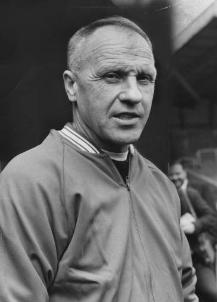
Back بيل شانكلي Arabic بيل شانكلى ARZ Vilyam Bil Şenkli Azerbaijani Біл Шэнклі Byelorussian Бил Шанкли Bulgarian Bill Shankly BS Bill Shankly Catalan Bill Shankly Czech Bill Shankly Danish Bill Shankly German
 | |||
| Personal information | |||
|---|---|---|---|
| Full name | William Shankly[1] | ||
| Date of birth | 2 September 1913 | ||
| Place of birth | Glenbuck, Ayrshire, Scotland | ||
| Date of death | 29 September 1981 (aged 68) | ||
| Place of death | Liverpool, England | ||
| Height | 5 ft 7 in (1.70 m)[2] | ||
| Position(s) | Right-half[nb 1] | ||
| Youth career | |||
| 1931–1932 | Cronberry Eglinton | ||
| Senior career* | |||
| Years | Team | Apps | (Gls) |
| 1932–1933 | Carlisle United | 16 | (0) |
| 1933–1949 | Preston North End | 297 | (13) |
| Total | 313 | (13) | |
| International career | |||
| 1938–1939 | Scotland | 5 | (0) |
| Managerial career | |||
| 1949–1951 | Carlisle United | ||
| 1951–1954 | Grimsby Town | ||
| 1954–1955 | Workington | ||
| 1956–1959 | Huddersfield Town | ||
| 1959–1974 | Liverpool | ||
| *Club domestic league appearances and goals | |||
William Shankly OBE (2 September 1913 – 29 September 1981) was a Scottish football player and manager who is best known for his time as manager of Liverpool. Shankly brought success to Liverpool, gaining promotion to the First Division and winning three League Championships and the UEFA Cup. He laid foundations on which his successors Bob Paisley and Joe Fagan were able to build by winning seven league titles and four European Cups in the ten seasons after Shankly retired in 1974. A charismatic, iconic figure at the club, his oratory stirred the emotions of the fanbase.[3][4] In 2019, 60 years after Shankly arrived at Liverpool, Tony Evans of The Independent wrote, "Shankly created the idea of Liverpool, transforming the football club by emphasising the importance of the Kop and making supporters feel like participants".[4]
Shankly came from a small Scottish mining community and was one of five brothers who played football professionally. He played as a ball-winning right-half and was capped twelve times for Scotland, including seven wartime internationals. He spent one season at Carlisle United before spending the rest of his career at Preston North End, with whom he won the FA Cup in 1938. His playing career was interrupted by his service in the Royal Air Force during the Second World War. He became a manager after he retired from playing in 1949, returning to Carlisle United. He later managed Grimsby Town, Workington[5][6] and Huddersfield Town before moving to become Liverpool manager in December 1959.
Shankly took charge of Liverpool when they were in the Second Division and rebuilt the team into a major force in English and European football. He led Liverpool to the Second Division Championship to gain promotion to the top-flight First Division in 1962, before going on to win three First Division Championships, two FA Cups, four Charity Shields and one UEFA Cup. It was during Shankly's tenure that the club changed to an all-red home strip, and "You'll Never Walk Alone" became the club's anthem. Shankly announced his surprise retirement from football a few weeks after Liverpool had won the 1974 FA Cup Final, having managed the club for 15 years, and was succeeded by his long-time assistant Bob Paisley. He led the Liverpool team out for the last time at Wembley for the 1974 FA Charity Shield.[7] He died seven years later, aged 68. Considered one of the greatest football managers of all time,[8][9] Shankly was among the inaugural inductees into the English Football Hall of Fame in 2002, and the Scottish Football Hall of Fame in 2004.
- ^ "Bill Shankly". Barry Hugman's Footballers. Retrieved 31 March 2017.
- ^ "Preston North End. Defensive lapses will worry Mr. Tom Muirhead". Sunday Dispatch Football Guide. London. 23 August 1936. p. vi – via Newspapers.com.
- ^ "Bill Shankly the great orator, a two-punch KO and super street flipping". The Guardian. Retrieved 6 February 2020.
- ^ a b "Bill Shankly remains the personification of Liverpool 60 years after he arrived on Merseyside". The Independent. Retrieved 6 February 2020.
- ^ Allen, Tom (1990). Team from Beyond the Hills. Martin Wingfield.
- ^ Allen, Tom (1 November 2005). Reds Remembered: The Definitive Workington AFC. Soccerdata. ISBN 1899468234.
- ^ "Bill Shankly: Timeline". LFCHistory.net. Archived from the original on 24 September 2015. Retrieved 29 August 2015.
- ^ "Ranked! The 100 best football managers of all time". FourFourTwo. 26 September 2023. Retrieved 22 November 2023.
- ^ "The 50 greatest football managers of all time". 90min. 20 August 2019. Retrieved 22 November 2023.
Cite error: There are <ref group=nb> tags on this page, but the references will not show without a {{reflist|group=nb}} template (see the help page).
© MMXXIII Rich X Search. We shall prevail. All rights reserved. Rich X Search